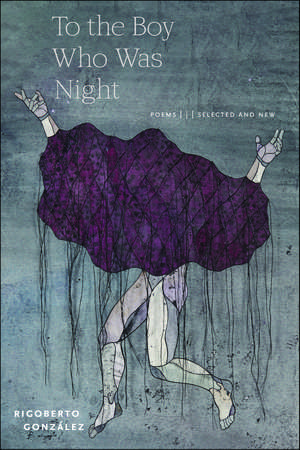To the Boy Who Was Night: Poems: Selected and New
Autor Rigoberto Gonzálezen Limba Engleză Paperback – 15 mar 2023
Preț: 110.92 lei
Nou
Puncte Express: 166
Preț estimativ în valută:
21.22€ • 22.21$ • 17.63£
21.22€ • 22.21$ • 17.63£
Carte disponibilă
Livrare economică 12-26 martie
Preluare comenzi: 021 569.72.76
Specificații
ISBN-13: 9781954245525
ISBN-10: 1954245521
Pagini: 280
Dimensiuni: 152 x 229 x 23 mm
Greutate: 0.57 kg
Editura: FOUR WAY BOOKS
Colecția Four Way Books
ISBN-10: 1954245521
Pagini: 280
Dimensiuni: 152 x 229 x 23 mm
Greutate: 0.57 kg
Editura: FOUR WAY BOOKS
Colecția Four Way Books
Recenzii
"Rigoberto González writes a richly detailed poetry, with strangely evocative landscapes, insightful appraisals of body and soul, and unpredictable narratives, sometimes set in Mexico, sometimes in California, sometimes places in his heart. His sense of wonder is magical and his personality evident — this is him, a poet who can claim a cadence like no other. A true and wildly engaging master." —Gary Soto
"How to deal with irreplaceable loss? Can poetry resurrect a lost culture? Can it be equal in force to the violence from which it arises? Rigoberto González has great compassion for the downtrodden, for those who do the terrible but necessary jobs. His genius is to bring alive the sensory experience that some paintings give us by a kind of synesthesia, so that we feel the poems in our skin and bones. In this stunning collection, a brilliant mind shapes a magical landscape from the ruins." —Toi Derricotte
"How to deal with irreplaceable loss? Can poetry resurrect a lost culture? Can it be equal in force to the violence from which it arises? Rigoberto González has great compassion for the downtrodden, for those who do the terrible but necessary jobs. His genius is to bring alive the sensory experience that some paintings give us by a kind of synesthesia, so that we feel the poems in our skin and bones. In this stunning collection, a brilliant mind shapes a magical landscape from the ruins." —Toi Derricotte
Notă biografică
Rigoberto González lives in Newark, NJ and is the author of eighteen books of poetry and prose, including previous Four Way Books publications The Book of Ruin (2019), Unpeopled Eden (2013), and Black Blossoms (2011). His awards include Lannan, Guggenheim, NEA, NYFA, and USA Rolón fellowships, the PEN/ Voelcker Award, the American Book Award from the Before Columbus Foundation, the Lenore Marshall Prize from the Academy of American Poets, and the Shelley Memorial Prize from the Poetry Society of America. A critic-at-large for the LA Times and contributing editor for Poets & Writers, he is the series editor for the Camino del Sol Latinx Literary Series at the University of Arizona Press. Currently, he’s Distinguished Professor of English and the director of the MFA Program in Creative Writing at Rutgers-Newark, the State University of New Jersey.
Extras
from Tostón
The floor collects the cells of your skin and no one
else’s. You’re breathing in only yourself in the dust.
Again, this doesn’t sadden you one bit. Perhaps
you used up the last drops of grief after you lost
your children. When you die, you’re the last piece
of evidence that your parents ever lived. And you?
What proof that you were once loved? Slowly
you rise and walk from one room to another
and both rooms scarcely notice the difference.
You are, dear friend, officially a tostón that 50¢
Mexican coin, half a peso, relic of the past, purveyor
of the simple pleasures of your childhood—paletita
de dulce sabor mango, canica ojo de dragón,
galletita de mantequilla, cacahuate japonés.
Moctezuma’s profile is engraved on this silver
moon, he always facing away from the sea,
looking back at the ruins of Tenochtitlán, not
with anguish or disdain, but with a dignified gaze
that says, What is done is done. No use crying
over what can never change. Or what is gone.
The floor collects the cells of your skin and no one
else’s. You’re breathing in only yourself in the dust.
Again, this doesn’t sadden you one bit. Perhaps
you used up the last drops of grief after you lost
your children. When you die, you’re the last piece
of evidence that your parents ever lived. And you?
What proof that you were once loved? Slowly
you rise and walk from one room to another
and both rooms scarcely notice the difference.
You are, dear friend, officially a tostón that 50¢
Mexican coin, half a peso, relic of the past, purveyor
of the simple pleasures of your childhood—paletita
de dulce sabor mango, canica ojo de dragón,
galletita de mantequilla, cacahuate japonés.
Moctezuma’s profile is engraved on this silver
moon, he always facing away from the sea,
looking back at the ruins of Tenochtitlán, not
with anguish or disdain, but with a dignified gaze
that says, What is done is done. No use crying
over what can never change. Or what is gone.
